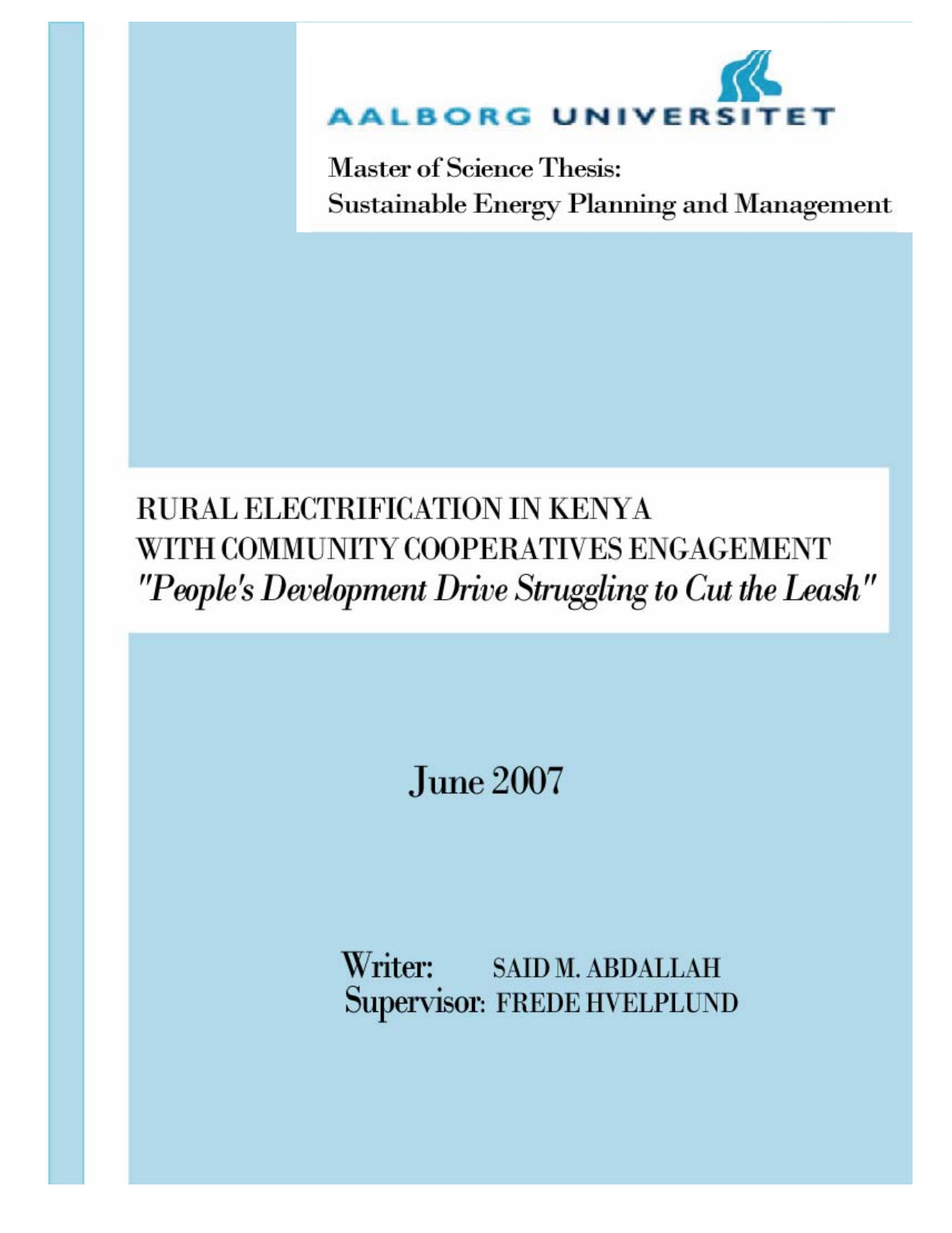
Rural Electrification in Kenya with Community Cooperatives Engagement: People's Development Drive Struggling to Cut the Leash
Translated title
Rural Electrification in Kenya with Community Cooperatives Engagement: People's Development Drive Struggling to Cut the Leash
Author
Term
10. term
Education
Publication year
2007
Submitted on
2007-06-20
Pages
186
Abstract
The countryside in most poor countries is home to large populations that eke their livelihoods out of subsistence agriculture. Increasingly, some of the rural people are seeking better lives in urban areas and trying to escape the misery of abject poverty and under-development back home. However, the majority of the countries’ populations remain non-urban. One of the reasons for the deprived condition of the populations is the very low access to developmental inputs like electricity. While industrialized countries and rich developing countries have electricity access to their rural populations at nearly 100%, the access in rural parts of poor countries is in to a large extent below 10%. A great deal of effort to improve the level of access is being made but the impact of the efforts is still minimal. It is argued in this thesis study that institutional and organizational barriers have a large part to play in the persistence of the low access to electricity. Conversely, it is contended that decentralization and bottom-up approaches offer ideal solutions towards overcoming the barriers. For example, in such approaches rural communities would be involved in electrification through means like cooperatives and utilization of local energy resources, The thesis study shows that cooperatives have been used successfully in substantially increasing availability of electric power in rural areas for both developing and developed countries. Examples of countries where electrification has been enhanced include USA, Bangladesh, and Costa Rica. However, in the case of Kenya, which the study specifically focuses on, it is evident that for the time being cooperatives are not suitable for electrification. Despite the existence of a high level of social capital in Kenya’s rural communities, and hence potential for cooperative resources, elite capture and lack of control of rural cooperatives by the communities are significant barriers to formation and performance of electricity cooperatives. Past rural electrification efforts have also been hampered by wrong institutional policies and political interference. Nonetheless, the Kenya government recognizes the challenges of cooperatives and electrification in the country and there are reforms being undertaken in the cooperative and energy sectors. There is a possibility that once undertaken the reforms would pave the way for the creation and deployment of rural electric cooperatives. Meanwhile, there is a possibility for using community self-help groups for rural electrification initiatives. These groups are socially rich but have low levels of economic efficiency. With some improvements they may serve as a substitute for cooperatives.
The countryside in most poor countries is home to large populations that eke their livelihoods out of subsistence agriculture. Increasingly, some of the rural people are seeking better lives in urban areas and trying to escape the misery of abject poverty and under-development back home. However, the majority of the countries’ populations remain non-urban. One of the reasons for the deprived condition of the populations is the very low access to developmental inputs like electricity. While industrialized countries and rich developing countries have electricity access to their rural populations at nearly 100%, the access in rural parts of poor countries is in to a large extent below 10%. A great deal of effort to improve the level of access is being made but the impact of the efforts is still minimal. It is argued in this thesis study that institutional and organizational barriers have a large part to play in the persistence of the low access to electricity. Conversely, it is contended that decentralization and bottom-up approaches offer ideal solutions towards overcoming the barriers. For example, in such approaches rural communities would be involved in electrification through means like cooperatives and utilization of local energy resources, The thesis study shows that cooperatives have been used successfully in substantially increasing availability of electric power in rural areas for both developing and developed countries. Examples of countries where electrification has been enhanced include USA, Bangladesh, and Costa Rica. However, in the case of Kenya, which the study specifically focuses on, it is evident that for the time being cooperatives are not suitable for electrification. Despite the existence of a high level of social capital in Kenya’s rural communities, and hence potential for cooperative resources, elite capture and lack of control of rural cooperatives by the communities are significant barriers to formation and performance of electricity cooperatives. Past rural electrification efforts have also been hampered by wrong institutional policies and political interference. Nonetheless, the Kenya government recognizes the challenges of cooperatives and electrification in the country and there are reforms being undertaken in the cooperative and energy sectors. There is a possibility that once undertaken the reforms would pave the way for the creation and deployment of rural electric cooperatives. Meanwhile, there is a possibility for using community self-help groups for rural electrification initiatives. These groups are socially rich but have low levels of economic efficiency. With some improvements they may serve as a substitute for cooperatives.
Keywords
Documents
